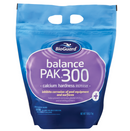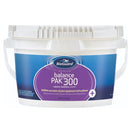Description
Bioguard's Balance Pak 300
• Granular calcium chloride
• For raising calcium hardness
• Inhibits corrosion of pool equipment and surfaces
Unique formulation means faster dissolving and less cloudiness. Boosts calcium hardness to help prevent equipment corrosion, etching of plaster and wrinkling of liners.
Testing Calcium Hardness:
We recommend taking a sample of your pool water to a dealer test station or using an advanced test kit.
What is Calcium Hardness?
Calcium hardness is the measure of how hard or soft your pool water is, and measures the amount of dissolved calcium and magnesium in your swimming pool. Just like pH and total alkalinity, it’s important to keep the calcium hardness balanced to prevent your pool water from becoming corrosive or scaling. However, before you attempt to balance your pools calcium hardness level, first make sure your pools total alkalinity level is balanced, then the pH and lastly calcium hardness. The ideal range for calcium hardness is 150-400 ppm (parts per million). Different Pool finishes Different Levels
Low Calcium Hardness
When pool water becomes too soft (i.e. its calcium hardness drops below 150 ppm) it becomes corrosive. If you don’t manually add calcium or magnesium back into the pool, the water will begin to take what it needs from any part of your pool or pool equipment that contains them such as stone, concrete, metal, grout Vinyl, etc,, Problems often associated with low calcium hardness include:
- Eroding of tile grouting and delaminating of plaster surfaces
- Etching or pitting of pool decks or stone and concrete surfaces surrounding your pool Corrosion of metal parts (i.e. pipes, ladders, filters, screws, etc.)
- Pitting of concrete pool flooring and walls
- swimming pool Liners contain Calcium Carbonate, Pools with low Calcium levels will source the calcium carbonate out of the vinyl causing the vinyl to wrinkle and expand.
Once damage from soft water occurs, there’s no way to undo it. The only way to fix the damage done by soft water is to replace or resurface the damaged part, so it’s imperative not to let your pools calcium hardness dip too far below 150ppm.
How to Raise Calcium Hardness in Your Swimming Pool?
If your pools calcium hardness level drops below the recommended 150 ppm the easiest and most common way to raise swimming pool calcium hardness is by adding a Balance Pak 300 calcium hardness increaser to your swimming pool.
High Calcium Hardness
Similarly to when the pools pH level is too high, when a pools calcium hardness level is too high it becomes basic and over saturated with dissolved particles including calcium. Over time, the pool water will become cloudy and the excess amount of dissolved particles in the pool will cause the water to scale in and around your pool equipment, possibly clogging and blocking the flow of water in and out of the pool, which can damage your pool equipment.
Note: Some pool sanitizers like Cal-Hypo based shocks contain calcium, Typically your discount shocks from online retailers, tik-tok, vevor, and big box stores like Meijer, Walmart, Sam's, Costco, etc. contain Calcium and will raise the calcium levels of the pool water
How to Lower Calcium Hardness in Your Swimming Pool?
There is really only one way to lower your pools high calcium hardness level and that is to partially or completely drain your hard pool water that has and replace it with fresh water that has a lower calcium level.
Payment & Security
Your payment information is processed securely. We do not store credit card details nor have access to your credit card information.





